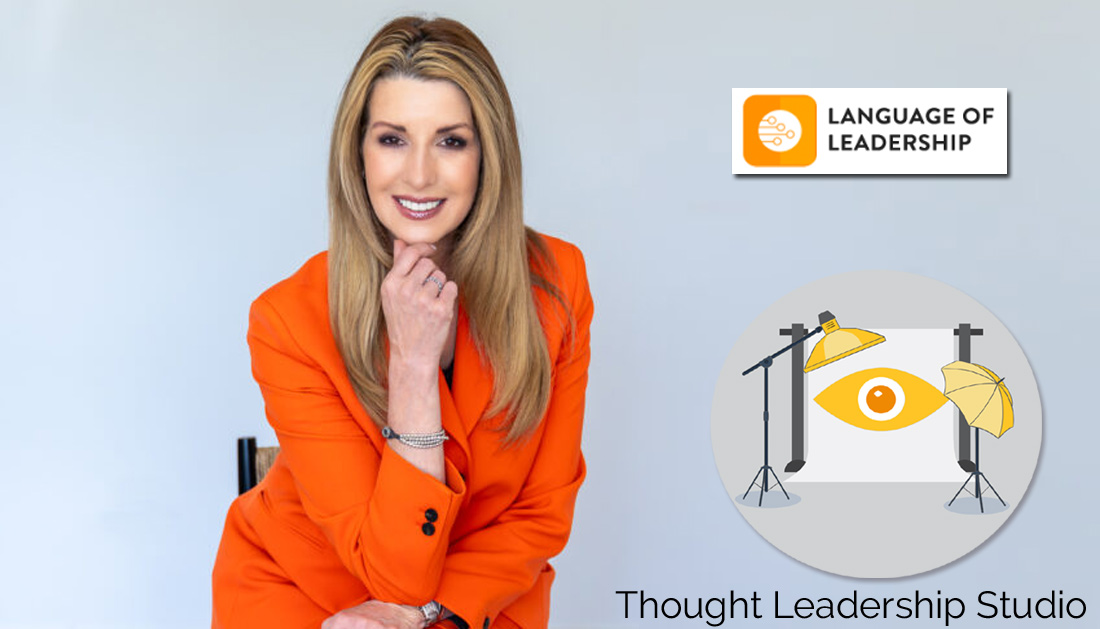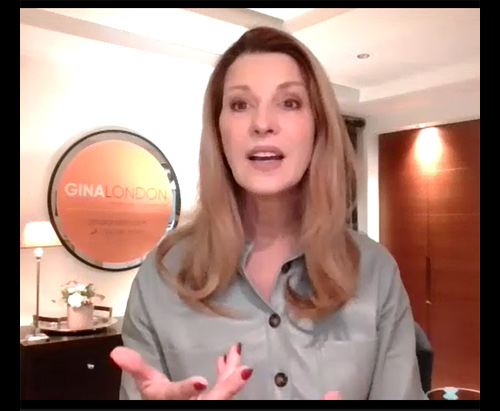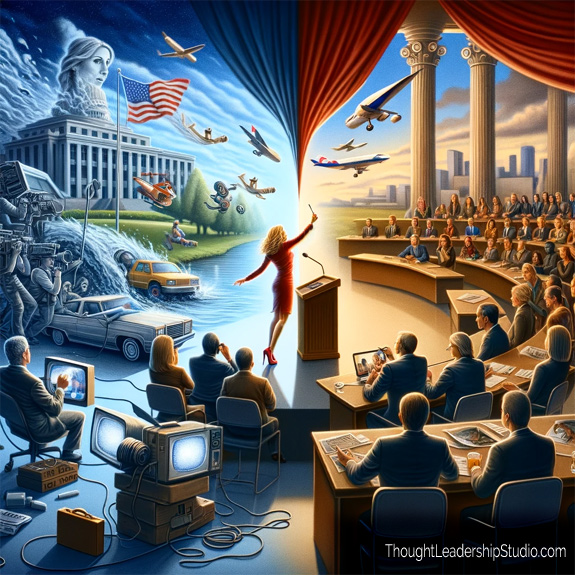Thought Leadership Studio Podcast Episodes:
Gina London on Executive Presence
Episode 63 - From Reporting the News on CNN to Helping Create It. Authenticity and Presence in Leadership.

#coaching, #communication, #executivepresence, #inspiration, #interviews, #leadership, #massinfluence, #paradigmshifts, #personalbranding, #thoughtleadership
Or Click here to listen or subscribe on appWhat this episode will do for you
:- Tracing Gina London's Career Path: Gain insights into Gina London's transition from a celebrated CNN correspondent to a leadership coach, and understand how her diverse experiences enrich her approach to leadership training.
- Leadership and Storytelling: Discover the importance of combining storytelling with leadership skills, and how this blend creates powerful and effective communication strategies in the corporate world.
- Empowering Authentic Leadership: Understand the nuances of crafting authentic leadership presence, and learn how authenticity plays a pivotal role in effective leadership and team engagement.
- Building a Thought Leadership Brand: Explore practical strategies for developing and showcasing your thought leadership, whether you're a seasoned professional or just beginning your journey.
- Impact of Communication in Leadership: Consider the transformative power of effective communication in leadership, and how it can foster trust, loyalty, and a positive organizational culture.
Gina London.
In this episode, I'm excited to introduce Gina London, an Emmy-Winning former CNN Correspondent turned leadership trainer. Over the past decade, Gina has transitioned from broadcasting to empowering senior executives at global companies like Google and Wells Fargo. She specializes in transforming communication and leadership skills, helping many to excel in their careers.
She shares her experience of working with women in Iraq who were running for parliament and how helping them tell their own stories inspired her to help others make a positive impact through effective communication.
Gina emphasizes the importance of aligning values with actions and developing executive presence to connect with and influence others. She also discusses her approach to coaching and training, including the use of video micro-lessons and exercises.
To make a difference in their leadership and influence, Gina recommends writing down negative thoughts and finding substitutions, working on voice projection and energy, and being mindful of body language.
Some of Gina's coordinates:
Curated Transcript of Interview with Gina London
The following partial transcript is lightly edited for clarity - the full interview is on audio. Click here to listen.
Chris McNeil: I'm Chris McNeil, with Thought Leadership Studio, and I'm sitting here across an ocean,with Gina London, an Emmy Award-winning former CNN correspondent and anchor with premier clients in five continents.
She guides top companies and executives in the world to positively connect and engage with their employees, their board, themselves, and - I would add - the world. Welcome Gina.
 Gina London: Thank you so much, Chris. It's great to be with you.
Gina London: Thank you so much, Chris. It's great to be with you.
Chris McNeil: Great to have you here. So we were just talking about what I might frame as your pivotal moment when you went from a career in broadcasting to a career in leadership training and empowerment.
Can you share a little bit about that with our listeners to kind of give them a frame of reference for where you're coming from?
Narratives of Change: Gina London's Path from CNN Correspondent to Leadership Guru
Gina London: Yeah, happily. And so I am an American, as you mentioned, we're talking from across the ocean. I live full-time in Europe, in Ireland now, but I started out as a journalist in the US with print in Orlando Sentinel. Then as you mentioned, for more than 10 years with CNN versus a writer and then as a correspondent and then as an anchor.
 So storytelling, telling other people's stories, finding a way to make a hook, finding a way to capture the attention of an audience from written word to on television was what I had learned over the years in that career. Then when my career at CNN was at an end, I took a job as a communication director for a large government affairs lobbying firm in the us. But I took my vacation time to go work in these emerging democracies as a volunteer trainer with an NGO, with a not-for-profit organization.
So storytelling, telling other people's stories, finding a way to make a hook, finding a way to capture the attention of an audience from written word to on television was what I had learned over the years in that career. Then when my career at CNN was at an end, I took a job as a communication director for a large government affairs lobbying firm in the us. But I took my vacation time to go work in these emerging democracies as a volunteer trainer with an NGO, with a not-for-profit organization.
And what we were doing then is helping civic-minded leaders, helping people that were trying to get out immunization awareness campaigns, issue campaigns in their countries, learn how to tell their stories. And the first group of people that I had the privilege of working with, and this is what we were talking about, were women from Iraq who were just now getting an opportunity to run for parliament.
So when I was able to help those people tell their own stories after I'd spent all these years helping or telling other people's stories for them, I thought, this is it. This is the transfer skill. This is not just something that I was born with because I had to learn it through the rigors of 24 hour news and how can I now help other people who have a positive message to, to want to make a positive difference in wherever they live, be able to tell it with energy, with passion concisely change pieces around depending on their audience, and impact that audience in a way that helps get them motivated and work together for what I hope is their common mutually beneficial outcome.
So that was that moment with working with these women who had their family's lives in mind, the progress of their country in mind, and how do I help them separate themselves from the pack? And that's what I do in essence with different people and different organizations all around the world to this day.
Chris McNeil: Well, that's really interesting. It seems to me like you're sitting at the edge of the tipping point of a paradigm working with the women in Iraq as they're getting into politics there.
Tipping Points of Influence in Global Leadership
That's really influential. That's a big deal. How does it feel to be at the tipping point of a paradigm shift like that?
Gina London: Well, I think in their situation particularly, it's still a very much of an uphill battle, not just for women, but for civic mindedness in that country as it still continues to try to progress in the pace that that is and the difficulties that come within a geopolitical situation that is in Iraq, for example.
But my hope is that one person at a time, depending on their level of influence, they can learn skills about content construction, about how they carry themselves, about how they evoke the energy and the passion they might have internally, externally so that they can be more captivating or more compelling or be that voice that's remembered among many that might be also trying to capture their attention. And so sometimes it's in the corporate realm.
Sometimes I'm still working with women in democracy building or a different type of charity. I do some work with UNICEF as well. So however, I had the opportunity to facilitating this year's international children's peace prize, for example. So it could be young leaders that are committed to trying to make a difference, positive difference in their world.
So whoever I get an opportunity to work with, if they're a human being committed to more positive impact and want me to help them amplify their voice, that's what it means. That's what it's all about for me.
Chris McNeil: So positive impact is what it's about for you. What does it do for you to have that positive impact?
Gina London: Well, I mean, it used to be, I guess in some ways that I was the voice. I was the face for different news events. And now to be able to give other people who are impacting in their worlds that voice or that confidence or that comfort even it fills me with joy, especially when I hear back from client like one, I can't share which company, but he's the chief technical officer of multinational beverage company based in Paris.
 So you can go do your homework, folks who are listening. And so he's got a real global audience in terms of how they go to market, how they're using generative AI, for example, to help process and get some of their product out there and the stories that they want to tell, how he wants to impact his whole internal organization and then share that at the web summit or when he's talking with a panel on the Guardian or the Economist, these big global publications.
So you can go do your homework, folks who are listening. And so he's got a real global audience in terms of how they go to market, how they're using generative AI, for example, to help process and get some of their product out there and the stories that they want to tell, how he wants to impact his whole internal organization and then share that at the web summit or when he's talking with a panel on the Guardian or the Economist, these big global publications.
And even how he's igniting and inspiring his team internally. So I've been working with him off and on for over about a year, and just a couple weeks ago was their most recent town hall meeting and his approach and his storytelling, the way he's bringing people's names in and actually checking them and calling them out and supporting them is different than he would've before.
He would've been just leaning in on the information and not leaning in on the human connection part, which you can learn about and then you can start to apply and you can develop it and it can be more natural for you over time. So on the heels of this town hall, his assistant sent him a note through WhatsApp that he screenshotted then over to me that said, your evolution and how you engage us is dramatic, and I think it's been worthwhile.
These meetings have been putting in your agenda with Gina, and that means everything because I don't see him do that. I'm not there day-to-day, but I get to hear the positive impact that he's making on other people when they reflect it back to him. And he was kind enough to share it with me.
So in a way, you're setting a ripple in motion, and when you get to hear back from someone that says It's changed the way I present, it's changed the way I talk with others, it's changed the way that I'm bringing my people along. It changes how I'm talking to the media. It changes how I'm talking, how I'm sharing, and as long as I am convinced that they're in it to do good or to make a positive impact that makes me happy.
So far, I've not heard any feedback of someone who's used it to be divisive or prey on people's fears because that's the other side of the coin. I mean, we can use our powers for good or not so good. And there are plenty of examples of people who can be charismatic and be rallying around messages that aren't bringing people together around something positive. So I'm grateful that I'm playing hopefully on the right team.
Chris McNeil: I see that you are. And a knife in the hands of a surgeon can save a life. In the hands of an assassin, it's a whole different thing. It's all about intent.
Gina London: Wow. There you go.
Creating the News Instead of Reporting It
Chris McNeil: I love to hear and see that it brings you joy to help create the news as opposed to report the news. Is that kind of a shift internally for you?
Gina London: Oh yeah, it really is. I mean, look, I got into TV news or I got into journalism because I think frankly, as a kid growing up in a small town in Indiana where I'm from, I saw journalism as a vehicle that could maybe help me travel to other places or meet other people or break out of the confines of the small town. I have great friends still from that small town, but it wasn't where I wanted to put my hat as I grew up. And so it did help for that.
And after that type of a situation, when I got onto CNN and then I was on tv, I'd be walking through an airport, for example, back when they used to have CNN airport on all of the different channels at the gates. Now everybody can get everything on their phone, but when I was on, that was the news.
And sometimes I'd be running through to get on a flight for a story and a recorded version of me would be playing as I'm running around. And it was weird and kind of fun. And my mom, for example, could say, I always knew where I would find you on TV if I looked at the headlines and knew what was going on that day because I did a lot of breaking news. So you go from a bit of a spotlight. I would certainly know Larry King or Christiane Amanpour or Wolf Blitzer, but you did have a bit of a spotlight. I did have a PR agent internally and I did occasionally get mail and that sort of thing.
And you go from having a bit of a spotlight to helping others now who have a spotlight. And so it is a shift, but it is rewarding in a different way because you are helping people with high profiles, with a lot of employees, with a lot of impact, usually corporately, I'm not doing as much on the global political geopolitical scale anymore, but these people are influencing other people too.
 And you hope if you can be planting these seeds and giving them these tools and then they can be paying it forward through their senior leadership team development that you are creating positive cultures, you're creating cultures that are recognizing people as human beings, you are multiplying their impact and not diminishing their productivity and their impact through these techniques and these approaches. And it's developable. And that's what gets me excited.
And you hope if you can be planting these seeds and giving them these tools and then they can be paying it forward through their senior leadership team development that you are creating positive cultures, you're creating cultures that are recognizing people as human beings, you are multiplying their impact and not diminishing their productivity and their impact through these techniques and these approaches. And it's developable. And that's what gets me excited.
A lot of people think it's either just for an extrovert or it's for someone else who's had a professional speaking career. It's not for me. I can't really impact that way. I've worked with very self-described introverts, and at the end of it, they don't necessarily want to go command a giant stage, but they do feel more confident that they're constructing in a way that they're decisive when they need to be clear that they're warmer when they maybe would just be leaning in on numbers.
And they actually tried these types of voice techniques or content development techniques to bring people along with them more. And it's not fake. It's not about teaching people to be manipulative or not genuine, but it is reminding them that there are choices that they can make and start to muscle memory and develop how they think about themselves and about their audience so that they can be more connecting, be more compelling.
And that again, it makes me happy when it makes them happy because it's made their employees or their teams or whomever is their audience more encouraged, more likely to go with them on even a company change, because that can always be resistant inducing. And so those types of things where you can bring people along with you because they want to, not because they have to. That's a difference,
Chris McNeil: Right? And that's an important point because a lot of people think of leadership or persuasion as "manipulative", and in a sense, everything we do, all of our interactions with other people are "manipulative". You can't not impact people.
But when you're adding choices, when you're helping people expand their choices, they can always go back to the old way of thinking if they choose to, it's still there. They just have a better choice, if they choose to take it: it's up to them.
But you're expanding the worlds by doing that, aren't you?
Gina London: Yeah. There's the leadership by right and title, the whole command and control thing where I say it, you have to do it, and that'll get you some compliance, but it won't get you respect, and it certainly won't get you loyalty, and it won't get people feeling like you're being nurturing a relationship and you're not creating bounds of trust. You're just wrapping people in bondage. So there's a big difference, especially if you want to have that lasting positive legacy and bring people along with you and not force them to come.
Chris McNeil: Absolutely. Well, you're liberating people from less empowering models of the world, less empowering beliefs, less empowering ways of thinking. So it's a liberating thing, and people revere their liberators. It is a very different dynamic than forced compliance, absolutely.
And I'm impressed by how you've taken your experience in mainstream media and organized it into a set of tools to empower people to communicate effectively. And I like the emphasis on executive presence, personal magnetism, whatever words you might put on that. I think that's something that's really important. How could you speak to that particular aspect and exuding or radiating a sense of leadership that people would want to follow because it's a better choice for them?
Gina London: Thanks for that question, because when I got started in this, it makes sense to tell everybody, Hey, it's been a journey. I didn't go from CNN to, Hey, executive presence, holistic leadership communications. What happened for me was I was initially asked after the foundation NGO work that I was doing, which was really more message, political campaigning, style of communications, platform, stump speeches, that sort of thing.
But when we get into the corporate world, I was asked initially by three execs over at SAP sap, they call it here in Europe, at the headquarters, which is in Waldorf, Germany. There were these three senior vice presidents who said, Hey, we've heard about you. We want you to help us with our presentation skills. No problem. That's construction. That's moving pieces around. That's a strong conclusion. I mean, that's storytelling. I can do that.
We also want you to help us with answering questions from the media. Sure, I can certainly role play a lot of those Q and as for you and help you feel more polished. Then they said, Chris, we also want you to help us with executive presence. And I was like, Google executive presence, what does that mean? I didn't work in corporate, I worked in TV news. We talk about ...
Chris McNeil: What is that? Did you give gifts for presents?
Crafting Authenticity and Presence in Leadership
Gina London: Yeah. What is that? We have presence (presents). How do you spell that? Good question. So that's what began me on this whole idea that we don't just train for a presentation, we don't just teach you to field questions. We teach you to change your mindset about knowing what your internal values are, identifying values, and I've worked with global CEOs even recently who go, wait, I've never done this values work before.
Well, good, it's time to start thinking about this because you're not just talking about your services and your products to your employees. You're talking about what motivates human beings. So you need to know what motivates you and you need to stand by. I mean, you don't have to, but it's better if you do. Let's put it this way, where I'm working, we're going to identify your internal values. Is it integrity? Is it kindness for a reason?
Is it compassion because people deserve it? I don't want this to know a word. I want you to link it to a why. Once we do that work, then I'm going to ask you, how do you demonstrate that externally? And this is the key, linking consistently your actions to your identified values in order to have positive desired outcomes.
That is what I call my authenticity definition, and it's the root of executive presence because it requires you to first do this work. Understand that that comes then with choices because you might feel, oh, well, I'm authentically really grouchy right now and I'm not in a good mood and I legitimately had a fight with my significant others, so now I'm going to go into this board meeting. Nope, no, I'm going to go not talk to my employees. I'm bringing all that with me. Nope, you are going to take a moment to reflect who's my audience?
What's my desired outcome for this? What are the choices I can make to recalibrate myself to externally exude what is required? And this takes effort and this, sometimes people go, well, that's that manipulative thing. No, it isn't. It's genuinely considering your audience understanding the version of you that you want to bring because we all have different versions of ourselves.
We have the timely grouchy version of ourselves that we need to park when we're needing to explain and encourage our team members that we've got end of the year projects and deadlines and projections that need to be met. If you just come in with the grouchy mandate, it's not going to have the same impact, same message, different way of delivering it, different version of you. This is what executive presence to me is. It's your choices to match your internal to your external, and how do we do that?
There's some mechanics involved, some people that don't feel like smiling and look like they're super serious or stern or maybe detached, might need to learn how to turn that on a little bit. You don't have to go from zero to 60, but you might have to go from zero to four. Just start to feel what that's like.
 So cultivating that curiosity about other people, accepting that you can develop your character and your personality traits and that even if you self-identify as an introvert or more logic brain and not as emotional brain, you can still start to bring more compassion, more warmth to who you are asking follow-up questions, nodding your head when the other person is talking, oh, that feels fake. Try it because the neuroscience out there, and I have ratified a lot of my practical stuff now with the neuroscience from the colleagues that I've had the privilege of working with.
So cultivating that curiosity about other people, accepting that you can develop your character and your personality traits and that even if you self-identify as an introvert or more logic brain and not as emotional brain, you can still start to bring more compassion, more warmth to who you are asking follow-up questions, nodding your head when the other person is talking, oh, that feels fake. Try it because the neuroscience out there, and I have ratified a lot of my practical stuff now with the neuroscience from the colleagues that I've had the privilege of working with.
They say, you don't change your thoughts with thoughts. You change your thoughts with actions. So when you self narrate about yourself a certain way, the only way to start to disrupt that is to physically change your reactions. So you're normally faces like this, this is just who I am. Okay, we're going to try smiling a little bit more. We're going to try asking questions a little bit more.
And I say, you go from default style of speaking and engaging, which is probably where most of us are to design. So we put in some of the pieces, we identify who you are, identify where you want to be, put in some of the design over time, that becomes your new default. I mean, oh, that sounds so big. It's not. It's the same way as when I was moving to Ireland. I got a car and the dealer handed me the keys and said, okay, there you go.
Well, they drive on the left side of the road here, and I had never done that ever my entire life. And so maybe part of my being my physical default of driving was the years I'd spent in the us, right Chris? And so now suddenly I have to be designed, I have to think, focus, talk to myself internally while I'm coming up to a roundabout and change the way I normally would do so I don't crash into people. It's the same approach.
Chris McNeil: Well, Gina, you give me a lot of good threads here. If I can read some of this back to you and make sure I'm capturing things that will be of special interest to our wonderful listeners.
One of them is this emphasis on values matching actions, and I would call that congruence.
***************************************
The transcript is lightly edited for clarity and is a partial transcript- the full interview is on audio. Click here to listen.
***************************************
Free Stuff and Offers Mentioned in Podcast
***************************************
***************************************